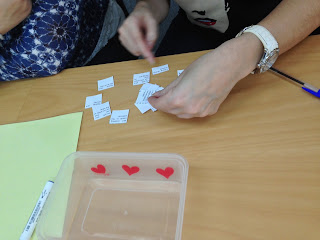On October 19th and 26th, together with Dolores Olveira, I had the privilege of giving a process writing workshop at CAFI Galicia. It was part of a larger course for English teachers (infant, primary and secondary levels) entitled Enriching English-learning environments (Ambientes de aprendizaxe do inglés).
Our aim was to explore the beliefs and methodology the teachers in our group use and then see what we could provide in terms of tips and ideas they could take back to their classes. The challenge, of course, was to present the contents and materials in an appealing, engaging and entertaining way, since the teachers came to the course right after a day's work! Not an easy task.
For the first session, I prepared a writing workshop. Of course, a writing workshop consists of... writing! I wanted to focus first exclusively on the writing process, so we went through the first 5 slides of this presentation and teachers had to actually do some of the writing tasks we normally assign to our students in class. After that, we devoted some time to discussing and reflecting on the experience they had just gone through. It was very enlightening and sobering. Most teachers said they had felt pressed for time, confused by the instructions, and overwhelmed by the tasks. Good! That was exactly the purpose.
We had a very interesting discussion where we ended up going over the principles of process writing, and came to the conclusion that writing has 3 main characteristics: it's complex, it's challenging, and it's creative. Those 3 Cs make it a high-order thinking skill in Bloom's taxonomy, and we must take it into account in our classes, both in terms of time allotted and lesson planning.
In the second part of the workshop, we went over the stages, to see if we were really applying them in our classes, focusing on the process rather than on the product.
It was not so obvious as it originally looked. Again, we had some time to discuss for example, whether it was better to work on writing skills in class or at home, when and how to assess, and what we considered adequate writing tasks. The conclusion was that we should include a consistent, structured, uninterrupted block of time in class where students can concentrate on the writing process. I briefly explained some of the projects I have developed in my EOI classes in sección Ribeira and was excited to see a lot of interest and enthusiasm.
For the second day, Dolores and I designed a Breakout EDU exclusively related to writing. You can find the instructions here and the documents here. It took hard work and a lot of hours to prepare all the tests and materials we wanted to include, since we wanted to include both the experience of writing as a student and the reflection a teacher needs after implementing something in class. We really hope they enjoyed it and it drove the point home that writing can be integrated within lessons in a fun way for both teachers and students.
To wrap up the workshop, Dolores Olveira, principal at CEIP Praia Xardín and teacher of English and Arts and Crafts (in English too), presented some of the activities and projects she has conducted in her school. You can see her presentation here. It is encouraging to see the amount of quality work she is doing. It was a real pleasure to learn from her methodology and the way she aims at integrating different subjects and skills in the school projects, not to mention the enthusiasm that permeates everything she does!
 |
| A yearly project that has now become a book |
 |
| A project integrating English, Arts and Crafts and Science |
It was a delight to see the involvement of all teachers coming to the workshop, the eagerness to work and learn, even after an exhausting day at school.
Thank you so very much for your attention, participation and kind remarks. We hope the principles of process writing are useful and applicable in your classes!

Thank you, Janet Torres, for this opportunity!





















No comments:
Post a Comment